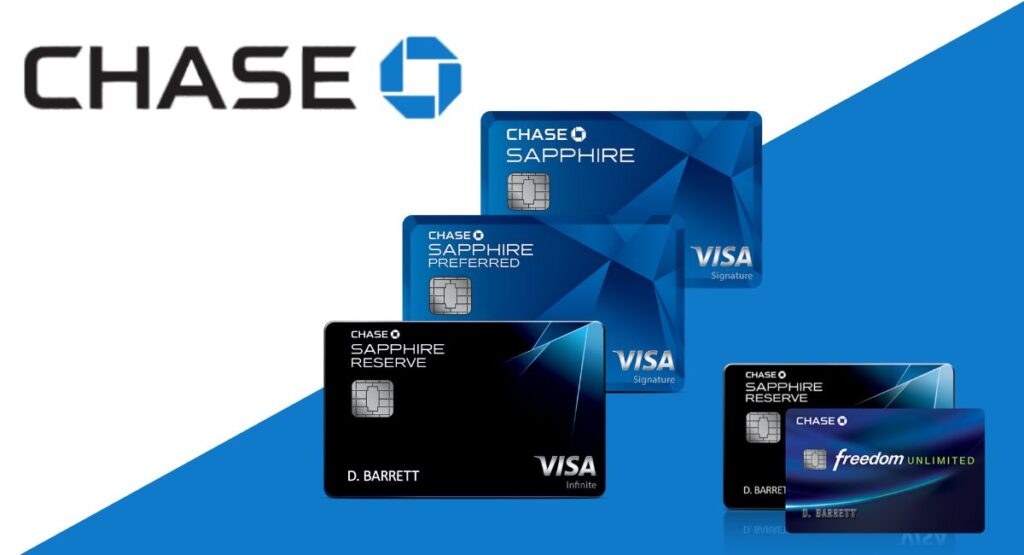Chase is a brand of JPMorgan Chase & Co., one of the largest and most well-known financial institutions in the United States. It offers a wide range of financial services, including banking, credit cards, mortgages, and investment products.
Chase is a prominent player in the credit card industry and issues a variety of credit cards to consumers and businesses.
what is Chase credit card?
A Chase credit card is a credit card issued by JPMorgan Chase & Co. These credit cards come in various types, each with its own set of features, benefits, and rewards programs.
Chase credit cards are popular for their reward programs, such as cash back, travel rewards, and points systems.
Some of the popular Chase credit cards include the Chase Sapphire Preferred, Chase Sapphire Reserve, Chase Freedom, and Chase Freedom Unlimited.
Many Chase credit cards offer rewards, which can be in the form of cash back, travel points, or miles. These rewards can be earned on everyday spending and redeemed for various benefits like statement credits, travel, or gift cards.
Chase credit card
Chase credit cards offer benefits like excellent transfer partners for diverse point redemptions, including Southwest Airlines, United Airlines, and Marriott. However, some drawbacks include high annual fees, ranging from $95 to $550, for the most rewarding cards, and the requirement of a high credit score for eligibility. It’s crucial to consider these factors to make an informed choice that aligns with your financial needs.

| Chase Credit Card | Card Name |
|---|---|
| Travel Rewards Cards | – Chase Sapphire Preferred® Card |
| – Chase Sapphire Reserve® | |
| – United℠ Explorer Card (co-branded with United Airlines) | |
| – IHG® Rewards Club Premier Credit Card (co-branded with IHG Hotels) |
| Chase Credit Card | – World of Hyatt Credit Card (co-branded with Hyatt) |
|---|---|
| Cashback Cards | – Chase Freedom® |
| – Chase Freedom Unlimited® | |
| – Chase Freedom Flex℠ | |
| – Ink Business Cash® Credit Card (for small businesses) |
| Chase Credit Card | – Ink Business Unlimited® Credit Card (for small businesses) |
|---|---|
| Business Credit Cards | – Ink Business Preferred® Credit Card (for small businesses) |
| – Ink Business Cash® Credit Card (for small businesses) |
| Chase Credit Card | – Ink Business Unlimited® Credit Card (for small businesses) |
|---|---|
| Airline Co-branded Cards | – United℠ Explorer Card |
| – United Club℠ Infinite Card | |
| – Southwest Rapid Rewards® Plus Credit Card (co-branded with Southwest Airlines) |
| Chase Credit Card | – Southwest Rapid Rewards® Premier Credit Card (co-branded with Southwest Airlines) |
|---|---|
| Hotel Co-branded Cards | – IHG® Rewards Club Premier Credit Card (co-branded with IHG Hotels) |
| – World of Hyatt Credit Card (co-branded with Hyatt) | |
| – Marriott Bonvoy Boundless™ Credit Card (co-branded with Marriott Bonvoy) |
| Chase Credit Card | – Marriott Bonvoy Bold™ Credit Card (co-branded with Marriott Bonvoy) |
|---|---|
| Student Credit Cards | – Chase Freedom® Student Credit Card |
| Chase Credit Card | – Chase Freedom Unlimited® Student Credit Card |
|---|---|
| No Annual Fee Cards | – Chase Freedom® |
| – Chase Freedom Unlimited® | |
| – Chase Freedom Flex℠ | |
| – Ink Business Cash® Credit Card |
| Chase Credit Card | – Ink Business Unlimited® Credit Card |
|---|---|
| Premium Cards | – Chase Sapphire Reserve® |
| – United Club℠ Infinite Card |
Using a Chase credit card is generally safe because Chase is a well-known bank that takes steps to protect your money and personal information. They give you a card with a special chip that makes it hard for crooks to steal your card details.
If someone uses your card without permission, Chase won’t make you pay for it. They also watch your card for strange or suspicious activity all the time. Chase’s website and app are secure, but make sure you’re on the real Chase website when you log in.
Keep your card safe and your PIN secret, and check your card statement for anything odd. If you lose your card, tell Chase right away.
While Chase tries to keep your card safe, you also need to be careful with it. If you see anything wrong with your card, contact Chase for help.
Pros
Cons
- Many options for cashback, travel rewards, or points.
- Generous bonuses for new cardholders.
- Airport lounge access, travel insurance, and no foreign transaction fees.
- Coverage for damaged, lost, or stolen purchases.
- Low or 0% introductory APR for balance transfers.
- User-friendly app for easy account management.
- 24/7 fraud monitoring and security measures.
- Some cards have annual fees.
- High interest rates on balances.
- Good to excellent credit needed for some cards.
- Fees on international purchases for some cards.
- Limited redemption options and blackout dates.
- Fees for balance transfers.
Most Chase credit cards typically necessitate a credit score that falls within the “good to excellent” range for approval. This is particularly true for Chase’s highly sought-after travel cards like the Chase Sapphire Reserve® and Chase Sapphire Preferred® Card.
It’s worth noting that while your credit score plays a significant role, several other factors can impact your eligibility, such as your income, existing debts, recent credit applications, and any other Chase cards you may already hold.
One potential exception is the Chase Freedom® Student credit card, which is designed with newer credit-builders in mind.
However, to qualify for this card, you must be enrolled in a college, university, or a career/trade school, and Chase will verify your enrollment status during the application process.
Be aware of when considering Chase credit card eligibility
In some cases, you may be limited to holding only one card within a specific “product family.” For instance, it’s generally not possible to possess both Sapphire cards simultaneously, nor can you typically hold multiple Chase-issued Southwest Airlines consumer cards.
However, exceptions exist, such as being able to have both the Chase Freedom Flex℠ and Chase Freedom Unlimited® cards.
It’s essential to consider the timing of sign-up bonuses. If you’ve previously had a Sapphire card and then canceled it, you’ll generally need to wait for 48 months before you become eligible for a new Sapphire card’s sign-up bonus.
Furthermore, you should be mindful of how many new credit cards you’ve opened over the past two years, as Chase follows the unofficial “5/24 rule.”
This rule implies that having received fewer than five credit card approvals in the past two years is typically required to qualify for a new Chase card. Business cards, such as the Chase Ink cards, may be exceptions to this rule.
As for interest rates on Chase credit cards, the specific rate you qualify for depends on your credit score and financial details provided in your card application, including your income and current debts.
Chase credit card interest rates are variable, meaning they can change over time and are often linked to the prime rate.
Lastly, your credit limit with a Chase credit card is also influenced by your financial situation, as well as the total credit available across your other cards.
Economic conditions can impact credit limits as well, with credit card issuers occasionally reducing limits during periods of financial uncertainty to mitigate their own risk.
Choosing the perfect credit card requires careful consideration of your financial goals and spending habits. In the realm of Chase credit cards, the options can be overwhelming, each offering unique perks, rewards, and benefits.
Here’s a guide to help you make an informed decision when selecting a Chase credit card that suits your needs.
Annual Fee: Before diving into the world of credit card perks, you need to decide if you’re comfortable paying an annual fee. Ask yourself if the benefits provided by a card justify the cost of the annual fee.
It’s not just about earning more rewards than the fee; it’s about whether the rewards you earn are valuable to you. Calculate the net gain after subtracting the annual fee and compare it to fee-free alternatives.
Welcome bonuses can offset the fee in the first year, but assess if the long-term benefits make it worthwhile.
Rewards: If rewards are your focus, consider your spending habits. Look at the categories where you spend the most and choose a card with a rewards structure that aligns with your expenses.
For travelers, co-branded Chase cards could offer more value if you have loyalty to a particular brand. Chase is known for its enticing welcome bonuses, which provide a substantial points or cash reward for meeting a spending threshold in the first few months.
While these bonuses are tempting, remember to weigh them against the card’s ongoing costs.
Benefits: Beyond rewards, explore a card’s additional perks. Travel insurance, reimbursement credits, and other benefits can provide substantial value, especially if something goes wrong during your travels.
Cards like the Chase Sapphire Reserve and Sapphire Preferred offer protection against lost luggage and collision damage waiver, which can bring peace of mind to frequent travelers.
How Many Chase Credit Cards Can You Have?
There’s no set limit to the number of Chase cards you can hold, but there are restrictions on how many you can be approved for within a specific timeframe. If you’ve received approval for five credit cards in the past 24 months, your application for a new Chase card will likely be rejected.
How to Increase Chase Credit Limit?
If you’re looking to increase your Chase credit limit, you can take several steps to make it happen. Chase may periodically raise your credit limit automatically, especially if you report an increase in your income and demonstrate responsible spending habits. To initiate a limit increase, the best approach is to call the number on the back of your card.
Applying for a Chase credit card is straightforward. You can complete the application online, providing personal and financial details, including your full name, address, social security number, and income.
Approval can be nearly instantaneous or take a few minutes, but it may also take some time for a decision. Once approved, your card will be mailed to you, and you can access your account online immediately.
- Visit the Chase website to explore the available credit card options.
Compare their features, rewards, and annual fees to choose the one that suits your needs. - Ensure you meet the eligibility criteria, which typically include a minimum credit score and income requirements.
- Collect personal and financial information such as your name, address, Social Security number, and employment details.
- Go to the Chase website or use their mobile app to initiate the online application process.
- Complete the application form with your personal and financial information.
- Choose the specific Chase credit card you wish to apply for.
- Review your application for accuracy, then submit it.
- Chase will review your application and may request additional information if needed.
- You’ll receive a decision by email or regular mail, typically within a few weeks.
- Once approved, you will receive your credit card in the mail.Follow the instructions provided to activate the card, usually by phone or online.
- Once activated, you can start making purchases with your Chase credit card.
Chase credit card eligibility requirements typically include factors such as your credit score, income, and other financial considerations. While specific requirements may vary depending on the type of Chase credit card you’re applying for, a good credit score is generally important.
Most Chase cards target consumers with good to excellent credit scores, which are typically considered to be in the 670 to 850 range. However, Chase may offer some cards with more relaxed credit requirements.
In addition to your credit score, your income is another critical factor. Chase often requires applicants to have a steady source of income, which helps determine your ability to repay the credit card balance.
Your debt-to-income ratio, which is a measure of your existing debts compared to your income, may also be assessed.
It’s important to carefully review the specific eligibility criteria for the Chase credit card you’re interested in, as they can vary. Chase may also consider other factors like your employment status and the number of recent credit inquiries.
Meeting these requirements and having a solid credit history will increase your chances of approval when applying for a Chase credit card.
Is Chase a good credit card?
What is a good credit card to get from Chase?
Is Chase a credit card company?
Is Chase hard to get a credit card with?
Is Chase a good beginner credit card?

Hey, I’m Ratiranjan Singha, the Creator of Myworldstuffs.com. I Offer in-Depth Articles and Guides that Help you to Understand Various Financial Concepts.







